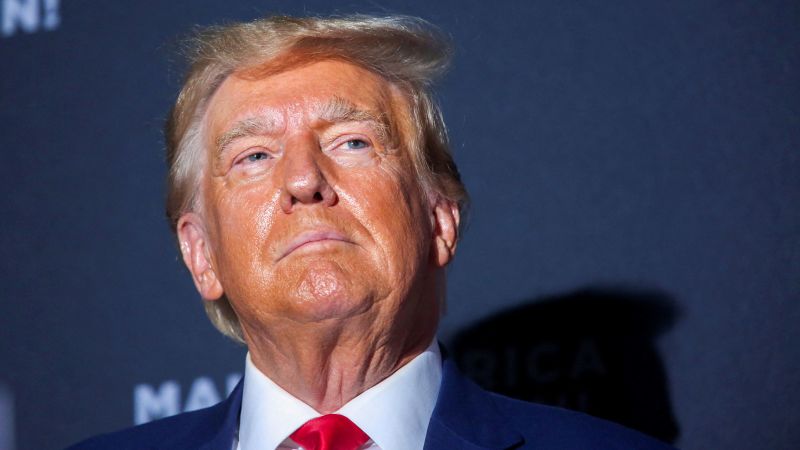Former President Donald Trump has announced that he will not be participating in the first Republican primary debate this week. Despite public calls for him to join the debate stage, Trump stated on social media that the public already knows who he is and therefore he will not be participating. However, a Trump adviser has revealed that he could still decide to participate in a later primary debate.
Trump has expressed his reluctance to debate at the Reagan Library, the location of the second debate, and has complained about not being invited to speak at the venue. The first primary debate of the 2024 cycle is scheduled for Wednesday, but Trump has been considering skipping it due to his lead in the polls. Instead, he is planning to sit for an interview with former Fox News Host Tucker Carlson.
Republican officials, including RNC chair Ronna McDaniel and David Bossie, who is in charge of the RNC debate committee, have visited Trump to encourage him to participate in the debate. Fox News president Jay Wallace and the network’s chief executive, Suzanne Scott, have also urged Trump to join the debate.
To qualify for the debate, candidates must meet certain criteria, including having at least 40,000 unique donors and reaching at least 1% in national polls. Candidates are also expected to sign a loyalty pledge to support the eventual Republican nominee.
So far, former Vice President Mike Pence, Florida Gov. Ron DeSantis, former South Carolina Gov. Nikki Haley, entrepreneur Vivek Ramaswamy, North Dakota Gov. Doug Burgum, South Carolina Gov. Tim Scott, former Arkansas Gov. Asa Hutchinson, and former New Jersey Gov. Chris Christie have all qualified for the debate.
Stay tuned for updates on this developing story.
Title: Trump’s Surprising Decision: Why He Won’t Join the First GOP Primary Debate
Introduction
In a surprising turn of events, former President Donald Trump has announced that he will not be participating in the first Republican Party (GOP) primary debate. This decision has left political pundits and supporters alike speculating about the motives behind Trump’s unexpected move. In this article, we will delve into the possible reasons behind Trump’s decision and analyze its potential implications for the GOP and the upcoming presidential race.
1. Trump’s Dominance in the GOP
One of the primary reasons behind Trump’s decision to skip the first GOP primary debate could be his overwhelming dominance within the Republican Party. Having secured the party’s nomination in 2016 and enjoying a loyal base of supporters, Trump may feel that participating in the debate is unnecessary. By abstaining, he can maintain his position as the de facto leader of the GOP, avoiding potential pitfalls or controversies that debates often entail.
2. Discontent with the Debate Format
Another possible explanation for Trump’s decision could be his dissatisfaction with the debate format itself. Throughout his political career, Trump has often criticized the traditional debate structure, arguing that it favors rehearsed soundbites over substantive policy discussions. By refusing to participate, Trump may be signaling his frustration with the format and his desire for a more unfiltered and direct means of communication with the public.
3. Strategic Calculations
Trump’s decision to skip the first GOP primary debate may also be a strategic move aimed at maintaining his media presence and controlling the narrative surrounding his candidacy. By abstaining from the debate, Trump can generate significant media attention and speculation, effectively overshadowing his opponents and ensuring that his campaign remains in the spotlight. This approach aligns with Trump’s previous unconventional campaign strategies, which have proven successful in capturing public attention.
4. Avoiding Potential Pitfalls
Debates can be treacherous terrain for candidates, with even the slightest misstep potentially damaging their campaigns. Trump, known for his unfiltered and often controversial remarks, may be seeking to avoid any potential pitfalls that could arise during the debate. By abstaining, he can sidestep the risk of making a gaffe or being caught off-guard, thereby preserving his image as a strong and decisive leader.
Implications for the GOP and the Presidential Race
Trump’s decision not to participate in the first GOP primary debate carries significant implications for both the Republican Party and the upcoming presidential race. Firstly, it underscores Trump’s continued influence within the GOP, as his absence will undoubtedly shape the dynamics of the debate and potentially overshadow his opponents. This move also highlights the unconventional nature of Trump’s political strategy, which has consistently defied traditional norms and expectations.
Furthermore, Trump’s decision may prompt other candidates to reconsider their own debate participation, potentially leading to a fragmented and less cohesive primary process. This could ultimately benefit Trump, as a divided field would make it easier for him to secure the party’s nomination once again.
Conclusion
Donald Trump’s surprising decision not to participate in the first GOP primary debate has sparked widespread speculation and debate. While the exact motives behind his move remain unclear, it is evident that Trump’s dominance within the Republican Party, discontent with the debate format, strategic calculations, and desire to avoid potential pitfalls all likely played a role in his decision. As the presidential race unfolds, the implications of Trump’s absence from the debate will undoubtedly shape the trajectory of the GOP and the overall political landscape.








